Project Insights Report
Energy to Digital Growth Education and Upskilling Project
 Executive Summary
Executive Summary
The Energy to Digital Growth Education and Upskilling Project (EDGE UP 2.0) is a sector-based training program designed to help displaced mid-career oil and gas professionals transition into IT roles in Calgary. Led by Calgary Economic Development, the program featured a mix of technical training, workplace readiness support and work-integrated learning. Over two cohorts, EDGE UP 2.0 nearly met its recruitment target, enrolling 309 participants, 84% of whom completed the program. Employment outcomes improved significantly, with rates increasing from 20% post-training to 60% nine months later. However, participants faced challenges in securing IT-specific roles, with 27% returning to the energy sector. Despite obstacles, the program demonstrated the feasibility of sector-based transitions for mid-career professionals and provided valuable lessons for scaling workforce development initiatives.
Key Insights
EDGE UP 2.0 enrolled 97% of its recruitment target, with 81% of participants unemployed at intake. Employment rates increased by 40 percentage points over nine months, with average annual earnings rising from $39,928 to $78,590.
Participants appreciated the practical training, knowledgeable instructors and flexible formats but noted challenges with capstone projects, internships and job readiness supports.
The program effectively engaged multiple stakeholders but faced challenges in employer participation, sector-specific job placements and alignment of training content with industry needs.
 The Issue
The Issue
The decline of Alberta’s oil and gas sector has displaced thousands of mid-career professionals, many of whom struggle to find comparable opportunities in other industries. Calgary Economic Development recognized the potential for these professionals to transition into the growing IT sector, leveraging their transferable skills. However, such transitions require targeted training, robust employer engagement and tailored support to address barriers such as skill gaps, wage disparities and confidence issues. EDGE UP 2.0 aimed to address these challenges through a structured, sector-based training model designed to bridge displaced professionals into in-demand digital roles.

 What We Investigated
What We Investigated
This evaluation examines the program’s ability to meet recruitment and completion targets, deliver effective training and support participants in achieving sustainable employment outcomes. It explores participant satisfaction, employment rates and program implementation challenges. Using a combination of surveys, administrative data, and interviews with participants and partners, the study provides insights into the program’s strengths and areas for improvement. It also assesses the impact of contextual factors, such as fluctuations in the oil and gas and IT job markets, on program outcomes.
 What We’re Learning
What We’re Learning
EDGE UP 2.0 succeeded in recruiting and training a diverse cohort of participants, 70% of whom were immigrants and 87% of whom held a bachelor’s degree or higher. The program’s completion rate of 84% demonstrates strong engagement, with participants reporting high satisfaction with technical training and workplace readiness components. Employment rates increased from 20% to 60% over nine months with many participants also experiencing significant gains in job satisfaction and annual earnings.
Capstone projects and internships provided valuable hands-on experience, but they also revealed gaps between the skills participants acquired in training and the competencies required for IT-specific roles. Only 32% secured IT-specific roles; with many citing mismatches between training and job opportunities. These insights highlight the need for stronger employer engagement in curriculum design to ensure training better reflects evolving industry demands.
 Why It Matters
Why It Matters
Programs like EDGE UP 2.0 are critical in addressing sectoral disruptions and workforce re-skilling needs, especially for mid-career professionals. By targeting oil and gas workers with transferable skills, EDGE UP 2.0 provides a model for leveraging local talent to meet the demands of a growing digital economy. However, its challenges underscore the importance of flexible, multi-sector strategies that can adapt to labor market shifts. Lessons from EDGE UP 2.0 can inform future workforce initiatives, ensuring they are better equipped to navigate economic volatility and support long-term career transitions.

State of Skills:
Better Labour Market Transitions for Mid-Career Workers
Supporting displaced mid-career workers requires a clear understanding of the barriers and difficulties they face, and it should also seek to build on highly valued skills developed through years of work and life experience.
Have questions about our work? Do you need access to a report in English or French? Please contact communications@fsc-ccf.ca.
More from FSC
Youth Jobs and Employment Career Pathing
Developing Women Leaders in the Digital Economy
Governing Sustainable Municipalities
How to Cite This Report
Blueprint ADE (2024). Project Insights Report: Energy to Digital Growth Education and Upskilling Project, Calgary Economic Development. Toronto: Future Skills Centre. https://fsc-ccf.ca/projects/edgeup2/
Energy to Digital Growth Education and Upskilling Project is funded by the Government of Canada’s Future Skills Program. The opinions and interpretations in this publication are those of the author and do not necessarily reflect those of the Government of Canada.




